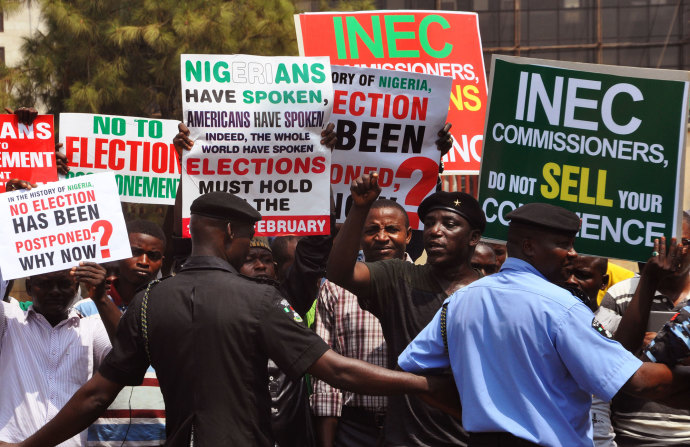By Alexis Okeowo
 Civil-rights groups staged a protest Saturday against any proposed postponement of the Nigerian elections. Credit Photograph by Olamikan Gbemiga/AP
Civil-rights groups staged a protest Saturday against any proposed postponement of the Nigerian elections. Credit Photograph by Olamikan Gbemiga/AP
Nigeria’s electoral commission has delayed the Presidential election, which was to occur this Saturday, by six weeks in order for the military to launch an operation to secure the northeast from Boko Haram and guarantee the safety of voters in the region. President Goodluck Jonathan, whose government is undeniably corrupt and who could well lose the election to his challenger, the former military ruler Muhammadu Buhari, stands to benefit from the postponement.
It’s true that people in the northeast would find it difficult to vote: more than a million and a half of them have fled their homes, while others are living under Boko Haram occupation or have been warned by the Islamist terrorists not to participate in the election. It’s also true that Boko Haram’s insurgency began almost six years ago. If the government can neutralize the group in just six weeks, what has taken so long?
Given the current crisis, it’s time for a reckoning with the country’s divisions. When Britain brought together ethnic groups with no particular allegiance to each other to form Nigeria in the early twentieth century, it set the stage for intensely ethnic politicking that continues today. Most Nigerians identify with their ethnicity first, their nationality second. Their home state government, which most often shares their ethnic affiliation, has been their most direct provider of education, employment, and social services.
They have long voted on an ethnic basis rather than on issues; issue-based campaigning barely exists because politicians distribute their resources and attention along ethnic lines. It is in this context that Jonathan operates. He is a southerner from the minority Ijaw group, and his home region, the Niger Delta, has been mired in extraordinary poverty compared to the rest of the country. When he took office, after President Umaru Yar’Adua died from heart failure in 2010, he inherited an intensifying Boko Haram insurgency and seemed not to think much of it.
The northeast was the domain of the Hausa and Fulani groups, and, particularly because northeastern politicians were widely believed to be involved in Boko Haram’s creation and growth, Jonathan saw the group’s campaign as a problem for local state leaders to deal with on their own.
Other southern Nigerians think the same way. Ask many southerners about the insurgency, and they’ll ask why Nigeria’s long succession of northern military rulers—the opposition candidate Buhari included—did not work harder to address the unemployment and poverty in their home states that led to Boko Haram’s creation.
There were other reasons Jonathan could ignore the violence. Boko Haram’s destruction was happening in a relatively underdeveloped, resource-poor region of the country; it did not interrupt the flow of oil wealth on which Nigeria depends. Foreign investors, while more cautious, continued to put billions of dollars into the economy. So when Boko Haram’s kidnapping of schoolgirls last spring sparked national and international furor, Jonathan was taken by surprise. For years, there had been little outrage from Nigerians—or at least from the ones who would vote for him—who saw the conflict as something that might as well have been happening in another country.
Now the tendency of northern and southern Nigerians to see themselves as separate from each other has caught up with the President. His failure to stop Boko Haram amid enormous bloodshed has become the most contentious point in the election, even more than his inability to expand electricity, diversify the economy, or account for missing oil funds. Opinion polls indicate that this Presidential race is the closest one yet in the country’s young democracy, and that voters of all ethnicities want to give Buhari a chance to repair what Jonathan has broken.
The reasoning is that Buhari, as a northern Fulani, would have a greater incentive to resolve a conflict in his own region, and, as a former major general, he would be able to root out the military officials who, because of greed and a desire to retain influence, are preventing Nigeria’s once capable soldiers from successfully fighting Boko Haram.
It’s a big wish. A Nigerian friend recently posted on Facebook a video of Buhari being interviewed on the BBC’s “Hard Talk” after he lost the Presidential election in 2004. The retired general refused to express regret over his abuse of the press, critics, and dissidents during his rule, from 1983 to 1985. He didn’t recognize a connection between his overthrow of Nigeria’s first democratically elected President, Shehu Shagari, and a disregard for democratic institutions. The interview is over ten years old, but it seems like a warning of what is to come if Buhari wins. In this race, it’s sometimes hard to identify who is the better option.















